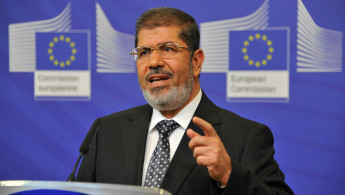Egypt must investigate Morsi's mistreatment, possible torture, on anniversary of president's death: HRW
Human Rights Watch has called for Egyptian authorities to be investigated over the alleged torture and mistreatment of former Egyptian President Mohamed Morsi.
The rights watchdog's call came on the first anniversary of the Freedom and Justice Party leader's death in a Cairo courtroom on 17 June last year.
HRW said the United Nations Human Rights Council, which will hold its next sitting on 24 June, should establish an investigation into Morsi's death, as well as ongoing violations of human rights in Egypt.
"Former President Morsi's death followed years of government mistreatment, prolonged solitary confinement, inadequate medical care, and deprivation of family visits and access to lawyers," said Sarah Leah Whitson, Middle East and North Africa director at Human Rights Watch.
"At the very least, the Egyptian government committed grave abuses against Morsi by denying him prisoners' rights that met minimum standards."
|
||
Morsi, 68, collapsed into a coma while being held in a courtroom cage during one of his trials. According to Egypt's Prosecutor General's Office, the former president lost consciousness after speaking for roughly five minutes.
Read also: Mohamed Morsi didn't 'die' - he was killed
During his six years in detention, Egyptian authorities allegedly denied Morsi sufficient medical care and blocked family visits. This was despite repeated requests to Egypt's judiciary for access to medical care.
HRW has highlighted that such treatment violates the International Covenant on Civil and Political Rights and contravenes the UN Standard Minimum Rules on the Treatment of Prisoners.
It also possibly amounts to torture under the UN Convention against Torture.
Morsi, a former scientist, became the country's first democratically-elected president in elections held following Egypt's 2011 uprising that toppled dictator Hosni Mubarak.
His time in office was cut short when a 2013 military coup led to his arrest, along with that of the Muslim Brotherhood's leadership. In mass trials criticised by rights groups, Brotherhood members were handed multiple life sentences and sentenced to death.
Since the coup, Egypt has been controlled by military general-turned-president Abdel Fattah al-Sisi, whose time in power has been characterised by increasing authoritarianism.
Follow us on Facebook, Twitter and Instagram to stay connected





 Follow the Middle East's top stories in English at The New Arab on Google News
Follow the Middle East's top stories in English at The New Arab on Google News


